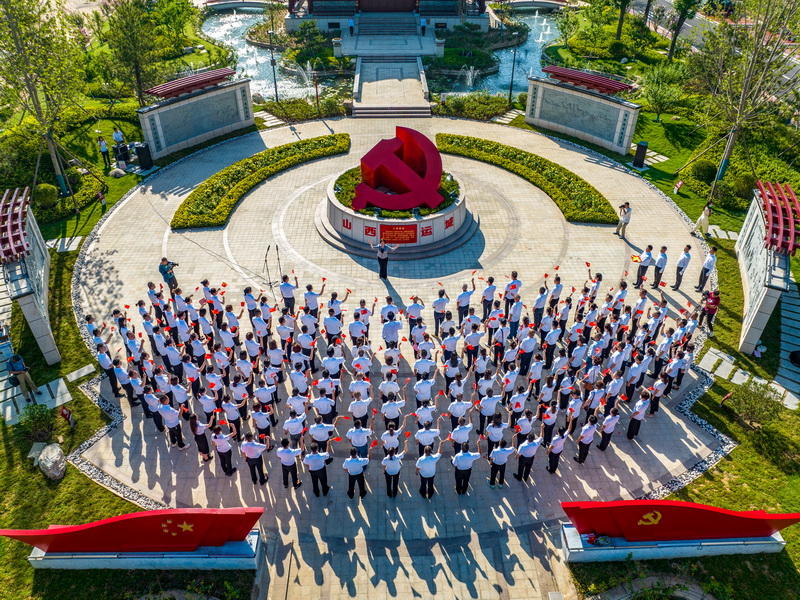A bowl of Taiwanese beef noodles inherit the "taste of home"
Author:Xinhua News Agency Time:2022.08.27
Xinhua News Agency, Taipei, August 27th (Reporter Yue Xitong Qi Xianghui) In an old commercial building in Wanhua District, Taipei, there is a old name called "Old Shandong Family Noodles", which originated in 1949. The veterans came to Taiwan in Qingdao, Shandong, and have inherited three generations so far.
When I walked into the noodle shop, the first thing that came into view was a few black -bottomed gold plaque. The current shopkeeper Yu Huaizheng introduced that the plaque was written by his grandfather Yu Xinzhi, one of which wrote the shop training "food virtue is the sky", and also talked about the history of the change of the noodle shop.
After Yu Xinzhi came to Taiwan from Qingdao, in order to maintain his livelihood, he used the only 70 dollars on his body to set up a small stall. At first, he mainly sold Shandong steamed buns for a living. In the era when the supplies were scarce, the corners of the dough were used as a hand -cut surface to use it. Yu Huaizheng still remembers his father's memories that the remaining beef bones left in the beef stall in the market make soup and cook a bowl of noodles, which is delicious on earth.
The veterans settled in the strange Taipei family, and most of them made small businesses in Ximending, Wanhua District. "Shandong people are hardworking and faithful, so my grandfather's business is very good." Yu Huaizheng said.
Under the hard work, the stalls of Yu's home slowly grew. Finally, in the 1970s, there was its own shop in Kunming Street today, and the business also turned to the main handmade knife cut beef noodles. In the old Shandong accent, many old guests like to call it "old Shandong", which is also the origin of the name of this shop. A few years later, the noodle shop moved to Xining South Road, and has been inherited to this day.
Yu Huaizheng remembered the business scriptures taught by the grandfather, doing one thing well, real materials, and excellence. "Entrepreneurship is easy to keep in business. I hope to inherit the spirit of grandpa entrepreneurship and dedication."
It is not only a noodle shop, but a variety of genre beef noodle shops in the streets and alleys in Taipei. During the heyday of Taoyuan Street, more than a dozen "beef noodles kings" were brought together, which became a scene in Taipei. The popularity of beef noodles was concentrated in Taipei, and the noodle shop was also a microcosm of beef noodles in Taiwan and prevailing.
Because the early Taiwanese agricultural society was mainly planting rice, pasta was not a staple food for locals. There are multiple versions of the origin of Taiwanese beef noodles. One of the inferences is that after 1949, due to food shortages, wheat, beef and other materials were introduced into the island, plus the "appetite transformation" of millions of veterans and relatives, and the dependents of Taiwan. Conditions for the encounter of beef and noodles.
Professor Ji Yaodong, the late gourmet critic, has been recognized by the statement of Taiwanese beef noodles from the veteran village. In the view of Huai Zeng, the grandfather drifted over the sea and came to Taiwan to settle in that time. He had to support his family. The "family permanent noodles" that he had done was the simplest and simple way to make a living. This bowl with noodles with hometown is also an emotional sustenance of the older generation when thinking.
Food is most warm. In addition to beef noodles, Yu Huaizheng also insisted on making handmade dumplings, which also inherited from the formula of his ancestors, retaining the traditional hometown flavor. He always reminded guests not to forget to drink dumplings soup, "My grandpa said, dumpling soup is a taste of home."
In the local area, beef noodles used to be the choice of students' belly, and it was also the love of the home -returning workers. Most of the impression of tourists from other places began in a bowl of beef noodles. Some customers say that a bowl of hot beef noodles exudes nostalgia and "home taste", and is also engraved in the collective memory of Taiwanese.
"The word of mouth is important, the taste is more important, and the familiar taste can most evoke the inner feelings of people's hearts. I want to work hard to continue the 'old Shandong'." Yu Huaizheng said.
- END -
Tanabata takes children to feel the charm of Han embroidery, Wuhan Cultural Tourism Volunteer starts the "Second Class"

The Yangtze River Daily Da Wuhan Client August 4th (Reporter Huang Lijuan Correspo...
Yuncheng Nanhu Red Cultural Park was completed and opened on the eve of July 1st

Yuncheng Nanhu Red Cultural Park was completed and opened on the eve of July 1stOn...